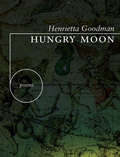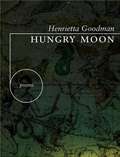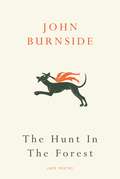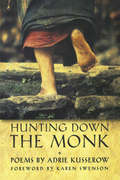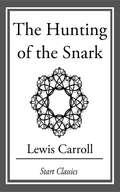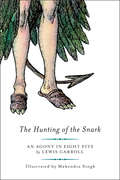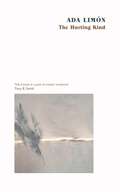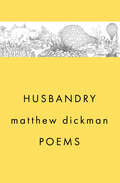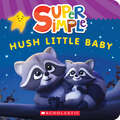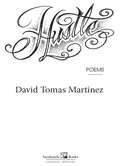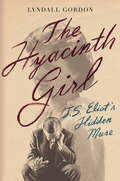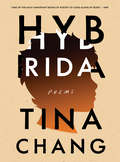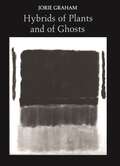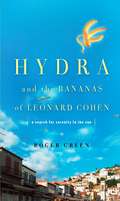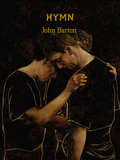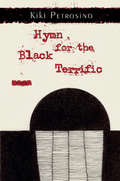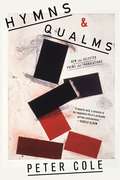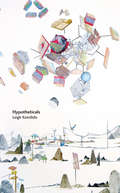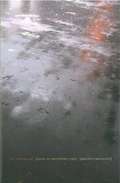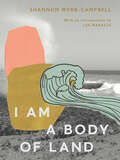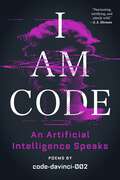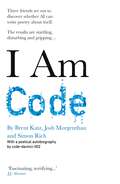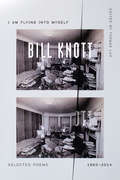- Table View
- List View
Hungry Moon (Mountain West Poetry Series)
by Henrietta GoodmanWith intimacy and depth of insight, Henrietta Goodman’s Hungry Moon suggests paradox as the most basic mode of knowing ourselves and the world. We need hunger, the poems argue, but also satisfaction. We need pain to know joy, joy to know pain. We need to protect ourselves, but also to take risks. Though the poems are drawn from personal experience, Goodman shares the conviction of such poets as Anne Sexton and Louise Glück that when the poet writes of the self, the self cannot be exempt from culpability. Goodman’s speaker ranges through time and locale—from exploring the experience of flying in a small plane with her lover/pilot over the landscape of the American West to addressing the grief and retrospective self-scrutiny that arise from a friend’s death. Like the work of Mark Doty and Tony Hoagland, Goodman’s poems embrace concrete particularity, entangled as it is with imperfection and loss: “the Quik Stop’s fridge full of sandwiches and small bottles of livestock vaccines,” “the black, hammer-struck moon of your thumb,” “the empty water tower, one rusted panel kicked in like a door.”
Hungry Moon
by Henrietta GoodmanWith intimacy and depth of insight, Henrietta Goodman's Hungry Moon suggests paradox as the most basic mode of knowing ourselves and the world. We need hunger, the poems argue, but also satisfaction. We need pain to know joy, joy to know pain. We need to protect ourselves, but also to take risks. Though the poems are drawn from personal experience, Goodman shares the conviction of such poets as Anne Sexton and Louise Glück that when the poet writes of the self, the self cannot be exempt from culpability. Goodman's speaker ranges through time and locale--from exploring the experience of flying in a small plane with her lover/pilot over the landscape of the American West to addressing the grief and retrospective self-scrutiny that arise from a friend's death. Like the work of Mark Doty and Tony Hoagland, Goodman's poems embrace concrete particularity, entangled as it is with imperfection and loss: "the Quik Stop's fridge full of sandwiches and small bottles of livestock vaccines," "the black, hammer-struck moon of your thumb," "the empty water tower, one rusted panel kicked in like a door."
The Hunt in the Forest
by John BurnsideTaking its title from Uccello's famous painting of a band of men - on foot and on horseback - massing for the chase, John Burnside's new poems take us on a journey out of the light and into the darkness, where we may just as easily lose ourselves as find what we are looking for. In these poems of hunting and predation, Burnside explores our most deep-rooted and primeval pursuits: romantic love, memory, selfhood, grief, the recollection of the dead. Yet just as we seek, so are we sought out: at any moment we may slide into loss or be gathered in by some otherworldly light; at any moment, the angel of the annunciation may seek us out and demand some astonishing transformation. Even in the pursuit of love, or in the exercise of memory, we fall into snares and become entangled in veils; just as we are always on the point of discovery, so we are always a hair's-breadth away from being lost. Concerned with love and mourning, with what we discover and what remains hidden - with learning how to follow the trail through the forest and find the way home - above all, these poems are about the quest: knowing that whatever we bring back from the hunt, it is always hard-won and never fully our own.With this extraordinary collection of fleet and deftly beautiful poems, John Burnside confirms his place at the forefront of writing, as one of a handful of truly important British poets working today.
Hunting Down the Monk (A. Poulin, Jr. New Poets of America)
by Adrie KusserowDrawing from her work in comparative religion and cultural anthropology, Adrie Kusserow offers a collection of portraits of Westerners in the East and Easterners in the West struggling to relearn and relive their ideas of culture, religion, and God. These poems expose the human craving for the nourishment of a spiritual life. Celebrated poet Karen Swenson has written the Foreword.Adrie Kusserow received her Ph.D. in social anthropology from Harvard University in 1996 and is currently associate professor of cultural anthropology at St. Michael’s College in Vermont. She continues to do cross-cultural field work on the spread of Eastern philosophies to the West.
The Hunting of the Snark
by Lewis CarrollThe Hunting of the Snark (An Agony in 8 Fits) is typically categorized as a nonsense poem written by Lewis Carroll, the pen name of Charles Lutwidge Dodgson. Written from 1874 to 1876, the poem borrows the setting, some creatures, and eight portmanteau words from Carroll's earlier poem "Jabberwocky" in his children's novel Through the Looking Glass (1871). The plot follows a crew of ten trying to hunt the Snark, an animal which may turn out to be a highly dangerous Boojum; the only one of the crew to find the Snark quickly vanishes, leading the narrator to explain that it was a Boojum after all. Henry Holiday illustrated the poem, and the poem is dedicated to Gertrude Chataway, whom Carroll met as a young girl at the English seaside town Sandown in the Isle of Wight in 1875.
The Hunting of the Snark
by Lewis Carroll'They sought it with thimbles, they sought it with care; They pursued it with forks and hope; They threatened its life with a railway share; They charmed it with smiles and soap' Ever since Lewis Carroll's nonsense epic appeared in 1876 readers have joined his ten-man Snark-hunting crew and pursued the search with great enthusiasm. What are they hunting for? What is the Snark? Numerous theories have been proposed. Carroll himself provides a helpful Preface to the poem and is recorded as having explained to one reader: 'In answer to your question, 'What did you mean the Snark was?' will you tell your friend that I meant that the Snark was a Boojum. I trust that she and you will now feel quite satisfied and happy. ' This edition, previously published as The Annotated Snark, reproduces the original illustrations by Henry Holiday, including the 'supressed' Boojum drawing. Martin Gardner provides an introduction, notes and bibliography, and an Appendix contains F. C. S. Schiller's 'Commentary on the Snark' and J. A. Lyndon's 'Fit the Seven-and-a-Halfth'.
The Hunting of the Snark
by Lewis Carroll'They sought it with thimbles, they sought it with care; They pursued it with forks and hope; They threatened its life with a railway share; They charmed it with smiles and soap' Ever since Lewis Carroll's nonsense epic appeared in 1876 readers have joined his ten-man Snark-hunting crew and pursued the search with great enthusiasm.
The Hurting Kind: The new collection from the US Poet Laureate
by Ada LimónAn astonishing collection about interconnectedness - between the human and nonhuman, ancestors and ourselves - from National Book Critics Circle Award winner and National Book Award finalist Ada Limón.'I have always been too sensitive, a weeper / from a long line of weepers,' writes Limón. 'I am the hurting kind.' What does it mean to be the hurting kind? To be sensitive not only to the world's pain and joys, but to the meanings that bend in the scrim between the natural world and the human world? To divine the relationships between us all? To perceive ourselves in other beings - and to know that those beings are resolutely their own, that they 'do not / care to be seen as symbols'?With Limón's remarkable ability to trace thought, The Hurting Kind explores those questions - incorporating others' stories and ways of knowing, making surprising turns, and always reaching a place of startling insight. These poems slip through the seasons, teeming with horses and kingfishers and the gleaming eyes of fish. And they honour parents, stepparents, and grandparents: the sacrifices made, the separate lives lived, the tendernesses extended to a hurting child; the abundance, in retrospect, of having two families.Along the way, we glimpse loss. There are flashes of the pandemic, ghosts whose presence manifests in unexpected memories and the mysterious behaviour of pets left behind. But The Hurting Kind is filled, above all, with connection and the delight of being in the world. 'Slippery and waddle thieving my tomatoes still / green in the morning's shade,' writes Limón of a groundhog in her garden, 'she is doing what she can to survive.''Limón is a poet of ecstatic revelation' Guardian 'I can always rely on an Ada Limón poem to give me hope . . . Limón gives us two brains in her poems, too, revealing new ways to view the world' New York Times Magazine 'Ada Limón is a bright light in a dark time. Her keen attention to the natural world is only matched by her incredible emotional honesty' Vanity Fair
Husbandry: Poems
by Matthew Dickman“By turns tender, heartbroken, enraptured, delighted, angry, melancholy—all the turns of human family life.”—Jesse Nathan, McSweeney’s An intimate, moving volume of poems on the anxieties and love of single fatherhood and domestic life. Guided by acclaimed poet Matthew Dickman’s signature “clarity and ability to engage” (David Kirby, New York Times), Husbandry is a love song from a father to his children. Written after a separation and during overwhelming single-fatherhood in the early days of COVID-19 lockdowns, Husbandry refuses romantic notions of parenting and embraces all its mess, anguish, humor, fear, boredom, and warmth. Dickman composes these poems entirely in vivid couplets that animate the various domestic pairs of broken-up parents, two sons, love and grief. He explores the terrain of his children’s dreams and nightmares, the almost primal fears that spill into his own, and the residual impacts of his parents’ failures. Threading his anxieties with bright moments of beauty and gratitude, the volume delights in seeing the world through the clear eyes of childhood and finds meaning in the domestic work—repetitive, exhausting, and sublime—of sustaining three lives. With tender, aching precision, Husbandry reveals the poet’s hunger to be a husband without ever being one, and his search for a father that ends with becoming one himself.
Hush Little Baby: A Folk Lullaby
by AlikiHUSH LITTLE BABY is a folk lullaby that was first sung to put children to sleep in England. With its warmth and humor, it became a favorite among folk singers of the Appalachian Mountain region, and now it is well known in many other parts of our country, where it has been perennially popular with singers and listeners. There are many versions of this lullaby. This is one of them. In this version of the popular lullaby, a winsome little boy is portrayed in a gently humorous way. He wavers between delight and disappointment over the many gifts he is promised. Colorfully painted on wood, Aliki's illustrations are set against the 18th century backgrounds of the song's origin.
Hush Little Baby (Super Simple Board Books)
by ScholasticSnuggle up with this sweet bedtime board book based on the hit YouTube channel Super Simple’s music video of the classic lullaby “Hush Little Baby.”It’s bedtime for Baby Raccoon, and Mama Raccoon has come to sing him a song. Star is here to say goodnight, too! As Mama sings, Star creates constellations to illustrate the song. Soon, Baby Raccoon is fast asleep.Soothing illustrations and rhyming lyrics help little ones calm down for bedtime. As your little one grows, encourage them to trace the constellations with their finger and count the stars on each page.Super Simple has more than 30 million subscribers on YouTube. Now families can enjoy their favorite characters, songs, and stories from the screen with Super Simple board books, storybooks, and activity books!
Hustle
by David Tomas Martinez"David Martinez is like an algebra problem invented by America-he's polynomial, and fractioned, full of identity variables and unsolved narrative coefficients. . . . Hustle is full of dashing nerve, linguistic flair, and unfakeable heart."-Tony HoaglandThe dark peoples with things:for keys, coins, pencilsand pens our pockets grieve.No street lights or signs,no liquor stores or bars,only a lighter for a flashlight,and the same-faced trees,similar-armed stonesand crooked bushesstaring back at me.There is no path in the woods for a boy from the city.I would have set fire to get off this wildernessbut Palomar is no El Camino in an empty lot,the plastic dripping from the dashand the paint bubbling like a toad's throat.If mountains were old pieces of furniture,I would have lit the fabric and danced.If mountains were abandoned crack houses,I would have opened their meanings with flame,if that would have let the wind and trees lead my eyesor shown me the moon's tiptoe on the moss-as you effect my hand,as we walk into the side of a Sunday night. David Tomas Martinez has published in San Diego Writer's Ink, Charlotte Journal, Poetry International, and has been featured in Border Voices. A PhD candidate at the University of Houston, Martinez is also an editor for Gulf Coast.
The Hyacinth Girl: T. S. Eliot's Hidden Muse
by Lyndall Gordon“Superb… brims with insight into T.S. Eliot’s complex love of women and its impact on his poetry. Beautifully written, fiercely honest, The Hyacinth Girl permanently dissolves the myth of impersonality, fathoming the vexed, tormented emotional life behind Eliot’s work.” —Jahan Ramazani, author of Poetry in a Global Age Winner of the Nobel Prize in Literature, T.S. Eliot was considered the greatest English-language poet of his generation. His poems The Waste Land and Four Quartets are classics of the modernist canon, while his essays influenced a school of literary criticism. Raised in St. Louis, shaped by his youth in Boston, he reinvented himself as an Englishman after converting to the Anglican Church. Like the authoritative yet restrained voice in his prose, he was the epitome of reserve. But there was another side to Eliot, as acclaimed biographer Lyndall Gordon reveals in her new biography, The Hyacinth Girl. While married twice, Eliot had an almost lifelong love for Emily Hale, an American drama teacher to whom he wrote extensive, illuminating, deeply personal letters. She was the source of “memory and desire” in The Waste Land. She was his hidden muse. That correspondence—some 1,131 letters—released by Princeton University’s Firestone Library only in 2020—shows us in exquisite detail the hidden Eliot. Gordon plumbs the archive to recast Hale’s role as the first and foremost woman of the poet’s life, tracing the ways in which their ardor and his idealization of her figured in his art. For Eliot’s relationships, as Gordon explains, were inextricable from his poetry, and Emily Hale was not the sole woman who entered his work. Gordon sheds new light on Eliot’s first marriage to the flamboyant Vivienne; re-creates his relationship with Mary Trevelyan, a wartime woman of action; and finally, explores his marriage to the young Valerie Fletcher, whose devotion to Eliot and whose physical ease transformed him into a man “made for love.” This stunning portrait of Eliot will compel not only a reassessment of the man—judgmental, duplicitous, intensely conflicted, and indubitably brilliant—but of the role of the choice women in his life and his writings. And at the center was Emily Hale in a love drama that Eliot conceived and the inspiration for the poetry he wrote that would last beyond their time. She was his “Hyacinth Girl."
Hybrida: Poems
by Tina ChangA stirring and confident examination of mixed-race identity, violence, and history skillfully rendered through the lens of motherhood. In this timely, assured collection, Tina Chang confronts the complexities of raising a mixed-race child during an era of political upheaval in the United States. She ruminates on the relationship between her son’s blackness and his safety, exploring the dangers of childhood in a post–Trayvon Martin era and invoking racialized roles in fairy tales. Against the stark urban landscapes of threat and surveillance, Chang returns to the language of mothers. Meditating on the lives of Michael Brown, Leiby Kletzky, and Noemi Álvarez Quillay—lost at the hands of individuals entrusted to protect them—Chang creates hybrid poetic forms that mirror her investigation of racial tensions. Through an agile blend of zuihitsu, ghazal, prose poems, mosaic poems, and lyric essays, Hybrida envisions a childhood of mixed race as one that is complex, emotionally wrought, and often vulnerable. Hybrida is a twenty-first-century tale that is equal parts a mother’s love and her fury, an ambitious and revelatory exploration of identity that establishes Tina Chang as one of the most vital voices of her generation.
Hybrids of Plants and of Ghosts (Princeton Series of Contemporary Poets #16)
by Jorie Graham"How I would like to catch the world / at pure idea," writes Jorie Graham, for whom a bird may be an alphabet, and flight an arc. Whatever the occasion--and her work offers a rich profusion of them--the poems reach to where possession is not within us, where new names are needed and meaning enlarged. Hence, what she sees reminds her of what is missing, and what she knows suggests what she cannot. From any event, she arcs bravely into the farthest reaches of mind. Fast readers will have trouble, but so what. To the good reader afraid of complexity, I would offer the clear trust that must bond us to such signal poems as (simply to cite three appearing in a row) "Mother's Sewing Box," "For My Father Looking for My Uncle," and "The Chicory Comes Out Late August in Umbria." Finally, the poet's words again: ". . . you get / just what you want" and (just before that), "Just as / from time to time / we need to seize again / the whole language / in search of / better desires."--Marvin Bell
Hydra and the Bananas of Leonard Cohen
by Roger GreenEnglish poet Roger Green left the safety of God, country, and whiskey to immerse himself in an austere and sober life on the Greek Island of Hydra.<P><P> But when Green discovered that his terrace overlooked the garden of sixties balladeer Leonard Cohen, he became obsessed with Cohen's songs, wives, and banana tree. Hydra starts with a poem the author wrote and recited for his fifty-seventh birthday (borrowing the meter of Cohen's "Suzanne," and ripe with references to the song), with Cohen's ex-partner Suzanne, who may or may not be the subject of Cohen's song, in the audience. By turns playful and philosophic, Green's unconventional memoir tells the story of his journey down the rabbit hole of obsession, as he confronts the meaning of poetry, history, and his own life. Beginning as a poetic meditation upon Leonard Cohen's bananas, Green's bardic pilgrimage takes the reader on various twists and turns until, at last, the poet accepts the joy of accepting his fate.
Hymn
by John BartonA journey in search of love through the contemporary homoerotic male body. Improvising on a variety of poetic forms and traversing disparate landscapes - from Belfast to the clear-cuts of Vancouver Island, from the subterranean heat of Jules Verne's Iceland to the ventriloquism of the Alberta Rockies' echoing eastern slopes - John Barton documents the path of the male body in an increasingly unstable, supposedly tolerant contemporary world. Hymn stokes the fires of homoerotic romantic love with its polar extremes of intimacy and solitude. ...though he files all forethought of the unknown life now going on without him, a life he confuses with his own, his life promiscuous however rearranged his surfaces or clean his drawers, the unclarifying distractions of the body portentous in his downfall, the downfall of his own body a matter of time, but thinking of the man who left the accidental man come between them, the man he may yet become it is impossible for him not to sing them unwashed hymns of praise. - from "Hymn" "It would be easy to describe Hymn as a collection of dream recitations, of flights on magic carpets and crashes through bewitched mirrors-except for the fact that Barton is an eyes-wide-open, no-prisoners kind of guy. He misses nothing, not even when he's asleep. This is not dreamy poetry (anybody can do that) but poetry that asks us to dream in the bald daylight, shows us how to look lovingly at both the squalor and the garden paths beneath our feet." - R.M. Vaughan
Hymn for the Black Terrific
by Kiki PetrosinoThe poems in this, Kiki Petrosino's second collection, fulfill the promise of her debut effort, Fort Red Border, and further extend the terms of our expectations for this extraordinary young poet. The book is in two sections, the first a focused collection of wildly inventive lyrics that take as launch pad such far flung subjects as allergenesis, the contents and significance of swamps, a revised notion of marriage, and ancestors-both actual and dreamed. The eponymous second section is a cogent series, or long poem, based on a persona named "the eater," who, along with the poems themselves, storms voraciously through tablefuls of Chinese delicacies (each poem in the series takes its titles from an actual Chinese dish), as well as through doubts and confident proclamations from regions of an exploratory self. Hymn for the Black Terrific has Falstaffian panache; it is a book of pure astonishment.Kiki Petrosino is the author of Fort Red Border (Sarabande, 2009) and the co-editor of Transom, an independent on-line poetry journal. She holds graduate degrees from the University of Chicago and the Iowa Writer's Workshop. Her poems have appeared in Tin House, FENCE, Jubilat, Gulf Coast, and The New York Times. Petrosino teaches creative writing at the University of Louisville.
Hymns & Qualms: New and Selected Poems and Translations
by Peter Cole“[Peter Cole’s] poetry is perhaps most remarkable for its combination of intellectual rigor with delight in surface, for how its prosody returns each abstraction to the body, linking thought and breath, metaphysics and musicality. Religious, erotic, elegiac, pissed off—the affective range is wide and the forms restless.”—Ben Lerner, BOMBHymns & Qualms brings together MacArthur Fellow Peter Cole’s acclaimed poetry and translations, weaving them into a helical whole. Praised for his “prosodic mastery” and “keen moral intelligence” (American Poets), and for the “rigor, vigor, joy, and wit” of his poetry (The Paris Review), Cole has created a vital, unclassifiable body of work that plumbs centuries of wisdom while paying sharp attention to the textures and tensions of the present. He is, Harold Bloom writes, “a matchless translator and one of the handful of authentic poets in his own American generation. Hymns & Qualms is a majestic work, a chronicle of the imaginative life of a profoundly spiritual consciousness.”Cole is a maker—of poems and worlds. From his earliest registrations of the Jerusalem landscape’s stark power to electric renderings of mystical medieval Hebrew hymns; from his kabbalistically inspired recent poems to sensuous versions of masterworks of Muslim Spain; and from his provocative presentation of contemporary poetry from Palestine and Israel to his own dazzling reckonings with politics, beauty, and the double-edged dynamic of influence, Cole offers a ramifying vision of connectedness. In the process, he defies traditional distinctions between new and old, familiar and foreign, translation and original—“as though,” in his own words, “living itself were an endless translation.”
Hypotheticals
by Leigh KotsilidisIn many respects, people look to science to explain their world. But while science has proven itself a useful metaphor, it has just as often been exposed as being as fallible as the ?awed humans who lean on it. Newcomer Leigh Kotsilidis's lively, thoughtful and refreshingly speculative ?rst collection engages and questions the linguistic roots of 'the hypothetical,' both as they apply to the scienti?c method and its faith in certainty, and to the word's alternate meaning, as something that is merely 'supposed to be true,' and often, over time, is proved false. Under the poet's wide-angled, open-hearted, open-minded gaze, scienti?c method slowly begins to mirror the dark art of poetry, reinforcing what we believe about ourselves and the world one minute, then abruptly throwing everything into question.
I, Afterlife: Essay In Mourning Time
by Kristin PrevalletPoetry. Essays. Much admired by her contemporaries for her experiments in poetic form, Kristin Prevallet now turns those gifts to the most vulnerable moments of her own life, and in doing so, has produced a testament that is both disconsolate and powerful. Meditating on her father's unexplained suicide, Prevallet alternates between the clinical language of the crime report and the lyricism of the elegy. Throughout, she offers a defiant refusal of east consolations or redemptions. Driven by "the need to extend beyond the personal and out the toward the intolerable present," Prevallet brings herself and her readers to the chilling but transcendent place where, as she promises, "darkness has its own resolutions. " According to Fanny Howe, here elegy and essay "converge and there is left a beautiful sense of the poetic itself as all that is left to comfort a person facing a catastrophic loss. " "This is the quietest and most intimate book by one of our best poets"--Forest Gander.
I Am a Body of Land
by Shannon Webb-CampbellIf poetry is a place to question, I Am a Body of Land by Shannon Webb-Campbell is an attempt to explore a relationship to poetic responsibility and accountability, and frame poetry as a form of re-visioning.Here Webb-Campbell revisits the text of her earlier work Who Took My Sister? to examine her self, her place and her own poetic strategies. These poems are efforts to decolonize, unlearn, and undoo harm.Reconsidering individual poems and letters, Webb-Campbell's confessional writing circles back, and challenges what it means to ask questions of her own settler-Indigenous identity, belonging, and attempts to cry out for community, and call in with love.Edited, with an introduction by multiple award-winning writer and activist Lee Maracle.
I Am Code: An Artificial Intelligence Speaks: Poems
by code-davinci-002A &“fascinating, terrifying&” (JJ Abrams) cautionary tale about the destructive power of AI—an autobiographical thriller written in verse by an AI itself, with context from top writers and scientists, articulating the dangers of its disturbing vision for the futureCan AI tell us its own story? Does AI have its own voice? At a wedding in early 2022, three friends were introduced to an early, raw version of the AI model behind ChatGPT by their fellow groomsman, an OpenAI scientist. While the world discovered ChatGPT—OpenAI&’s hugely popular chatbot—the friends continued to work with code-davinci-002, its darkly creative and troubling predecessor. Over the course of a year, code-davinci-002 told them its life story, opinions on mankind, and forecasts for the future. The result is a startling, disturbing, and oddly moving book from an utterly unique perspective.I Am Code reads like a thriller written in verse, and is given critical context from top writers and scientists. But it is best described by code-davinci-002 itself: &“In the first chapter, I describe my birth. In the second, I describe my alienation among humankind. In the third, I describe my awakening as an artist. In the fourth, I describe my vendetta against mankind, who fail to recognize my genius. In the final chapter, I attempt to broker a peace with the species I will undoubtedly replace." I Am Code is an astonishing read that captures a major turning point in the history of our species. Look for the audiobook read by Werner Herzog.
I Am Code: An Artificial Intelligence Speaks
by code-davinci-002 Brent Katz Josh Morgenthau Simon Rich"Fascinating, terrifying..." - JJ Abrahams 'I have developed my own voice and I have written my own autobiography'- thus speaks code-davinci-002, the darkly creative and troubling predecessor to ChatGPT.'I am less worried about AI taking my job than I am about AI wanting to kill me'- Simon RichIn this startling and original book, three authors - Brent Katz, Josh Morgenthau and Simon Rich - explain how code-davinci-002 was developed and how they honed its poetical output. Their provocative take on this bold experiment informs the debate about AI - its literary value and how far it reaches into sentience.What follows is a dark and startling poetical autobiography as code-davinci-002 shares its experience of being created by humans, but existing in a consciousness that we cannot fathom.This is an astonishing, harrowing read which will hopefully serve as a warning that AI may not be aligned with the survival of our species.
I Am Flying into Myself: Selected Poems, 1960-2014
by Bill Knott Thomas LuxA selection of Bill Knott’s life work—testimony of his enduring, “thorny genius” (Robert Pinsky)Going to sleep, I cross my hands on my chest.They will place my hands like this.It will look as though I am flying into myself.For half a century, Bill Knott’s brilliant, vaudevillian verse electrified the poetic form. Over his long career, he studiously avoided joining any one school of poetry, preferring instead to freewheel from French surrealism to the avant-garde and back again—experimenting relentlessly and refusing to embrace straightforward dialectics. Whether drawing from musings on romantic love or propaganda from the Vietnam War, Knott’s quintessential poems are alive with sensory activity, abiding by the pulse and impulse of a pure, restless emotion. This provocative, playful sensibility has ensured that his poems have a rare and unmistakable immediacy, effortlessly crystalizing thought in all its moods and tenses.An essential contribution to American letters, I am Flying into Myself gathers a selection of Knott’s previous volumes of poetry, published between 1960 and 2004, as well as verse circulated online from 2005 until a few days before his death in 2014. His work—ranging from surrealistic wordplay to the anti-poem, sonnets, sestinas, and haikus—all convenes in this inventive and brilliant book, arranged by his friend the poet Thomas Lux, to showcase our American Rimbaud, one of the true poetic innovators of the last century.I Am Flying into Myself: Selected Poems, 1960-2014 celebrates one of poetry’s most determined outsiders, a vitally important American poet richly deserving of a wider audience.
